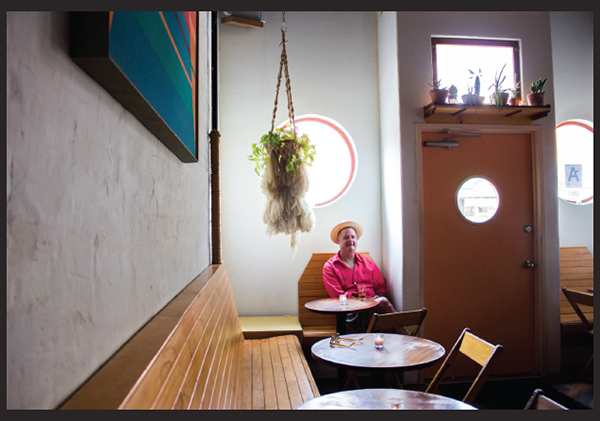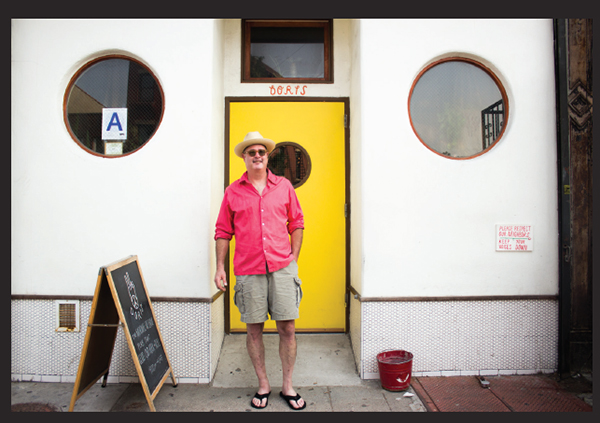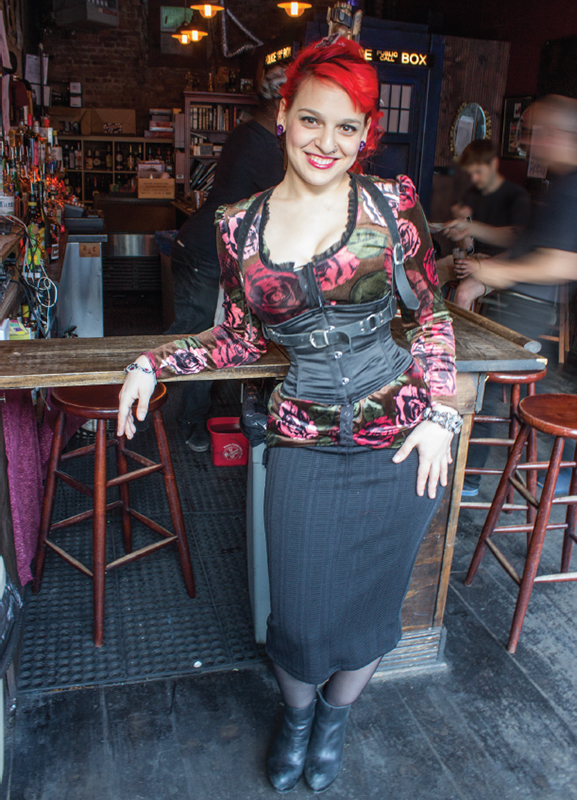

Former Chopped Chef Alan Harding’s Reputation Precedes Him at Doris
Alan Harding has a reputation. He’s known as the Godfather of Brooklyn’s Dining Renaissance. He’s known as a champion chef on the show Chopped from the Food Network. He’s known as a pioneer who in 1997 began bringing finer dining to Brooklyn with his restaurant Patois on Smith Street in Cobble Hill. When I ask him just how many Brooklyn establishments he’s opened or helped open, even he doesn’t know for sure. In an August 2014 article titled “Alan Harding, a Brooklyn Restaurant Pioneer, Reshapes His Career,” the New York Times noted that fifteen years ago, Alan “sat atop an empire of more than a dozen cheap but charming restaurants.” The rest of the story seemed to suggest his downfall. Apparently, the empire he built inspired so many disciples, or perhaps imitators, that his own castle began to crumble.
When I ask the fifty-year-old former celebrity chef and father of three what his profession is now, his answer is as varied as all that’s said about him online. He says he’s “trying to take the next step up from entrepreneur,” before adding, “to the next something, which will probably involve real estate, and I hope it involves design, and I hope it involves food.” Which sounds fairly clear. But food’s not a requirement. If he had to use stream-of-consciousness, he says, it would be like, “environmental, spiritual, sustainable, agrarian, reusable, nonviolent, musical, building things, creating things, and not necessarily being the guy behind the counter—not that there’s anything wrong with that—making something and seeing it go to a good place, and be fruitful.” Got all that?
As Alan sits at the bar at Doris in Bed-Stuy—the neighborhood he’s lived in, off and on, since 2002—he sips on his glass of Powers whiskey neat and speaks easily about a life that doesn’t sound nearly as fallen as the press makes it out to be. “I’m not one to mince words,” he says, “nor do I suffer fools lightly. And it may have bit me in the ass a couple times.” It’s obvious that Alan is a passionate, driven, and assured guy with a lot of ideas. And as relaxed as he is, Alan has a pronounced presence. Jason Andrews, the bartender and owner, recalls the first time Alan arrived at Doris. He looked dirty, Jason said, but also he wore a seersucker suit and a straw hat. He sat at the bar obviously observing the place with its Southwestern American vibe (Native American rugs and succulents) like a person who deeply understood the bar and restaurant scene. As soon as you encounter Alan at a bar, you instantly feel that certain knowledge and perspective of his, one that’s obviously beyond your usual regular. I talked to Alan about Doris, about Brooklyn, about places like this, and what they mean to regulars and to Brooklyn today, eighteen years after he changed the face of Brooklyn dining forever.

I definitely consider myself a social drinker, but I could see where it could be a profession.


It’s a filthy habit. Drinking. I have no problem with being a regular in a bar or with drinking. However, if we were all to aspire to be the Dalai Lama or Bill Murray—you get a lot more done when you don’t drink.
You have to reward yourself for a job well done. That’s what I do every day when I come here. When it’s this quiet I use it as a refuge to center myself. And I can leave here with a list and have my map for tomorrow. I usually have a notepad.
I remember riding my bike by when they did the construction. It was a job site. I looked in, and it was a facade and I thought, “Wow, that’s a ballsy move to do a project like this in this neighborhood.” I just thought it was brilliant because I knew it was an underserved neighborhood, but I also wasn’t sure if it was going to be you know, a ghetto shitshow every night. It was not what I thought it would be. I always believe: if you build it, they will come. And that sort of ghetto paranoia, gangster, thug thing: it’s almost urban myth at this point. It doesn’t exist. Not in this neighborhood.
That ghetto paranoia, gangster, thug thing: it’s almost urban myth at this point.
I like it when it’s quiet. Maybe it’s my age or because I start my day at 5 or 5:30. I can’t hang all night.
Old black folk and crazy people and teachers that are kicking it up after their long day of dealing with madness. And artists and young people and construction workers. It’s all over the place in terms of people who come here.
All the bartenders that work here love music, collect vinyl, play vinyl. Every time I come here, I hear a record I haven’t heard before and think, “Are you fucking kidding me?”
I don’t remember being a regular at any bar. To put it in perspective, for the last five years, I’ve been a dad. Right, so where’s dad? He’s at the bar? No, that doesn’t flush. No, we got homework to do. We got a fucking volcano to build. But now that my kids are older and on their own and doing projects without me, I have more time. Like I can really focus on my drinking.
Regulars are the lifeblood of an establishment because they are always there through the good times and the bad times. They are not like a person who read about it on their in-flight magazine from Oslo, and they are not going to go there with their fucking luggage and ask fifty thousand questions about the beer list and get a glass of water. Regulars are what put the dollars in the register. Regulars are the ambassadors of the place, and they tell people about the place. And then there are those people who come to the place for a different reason other than being a regular.
Now that my kids are older, I can really focus on my drinking.
If a regular goes into the bathroom and notices that someone took a shit on the floor, they will leave the bathroom and tell the owner discreetly and say someone took a shit on the floor. Or if I’m in the bathroom, and I notice that the candle is almost out and there’s another candle next to it, I’ll light the other candle and blow the other candle out. It’s like a proprietorial camaraderie.
You don’t have to worry about them robbing you, about them running out. You don’t have to worry about them doing something stupid. And if they were ever to do something stupid, you could say, “Hey, shut the fuck up.” You know? Because you have that relationship and sometimes regulars get out of hand. I’ve seen it.
I hosted the Doris Christmas party at my house. I was excited about bringing my friends and the people I spend lots of time with to my home. That sounds a little twee, but I was excited about sharing my life with them because they’ve shared so much with me. I had to clean up some throw up, although I know who did it, and I don’t blame her. But it was a win-win. It’s not a good party unless someone throws up.
June 11, 2015

(Photos by Nicole Disser)